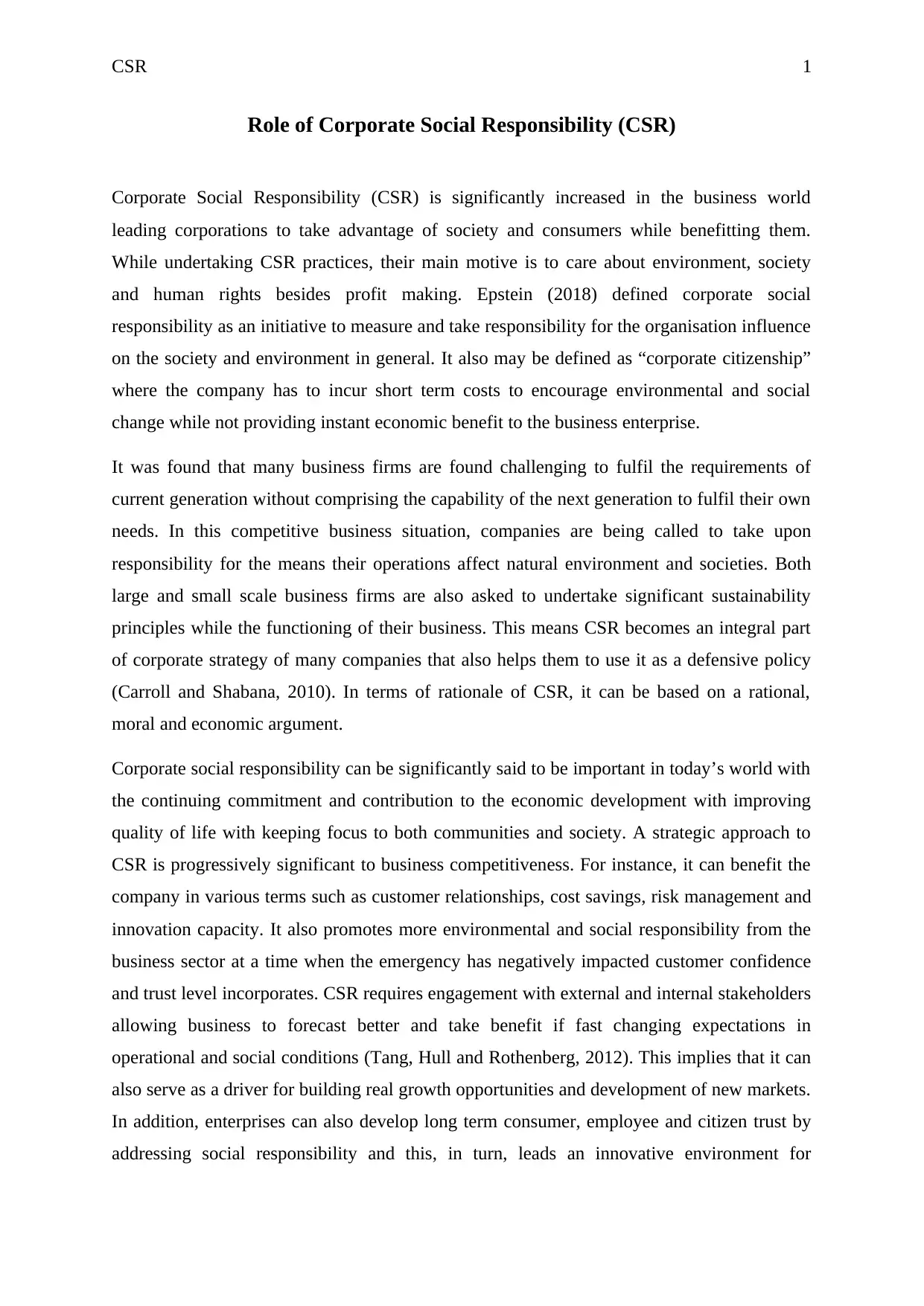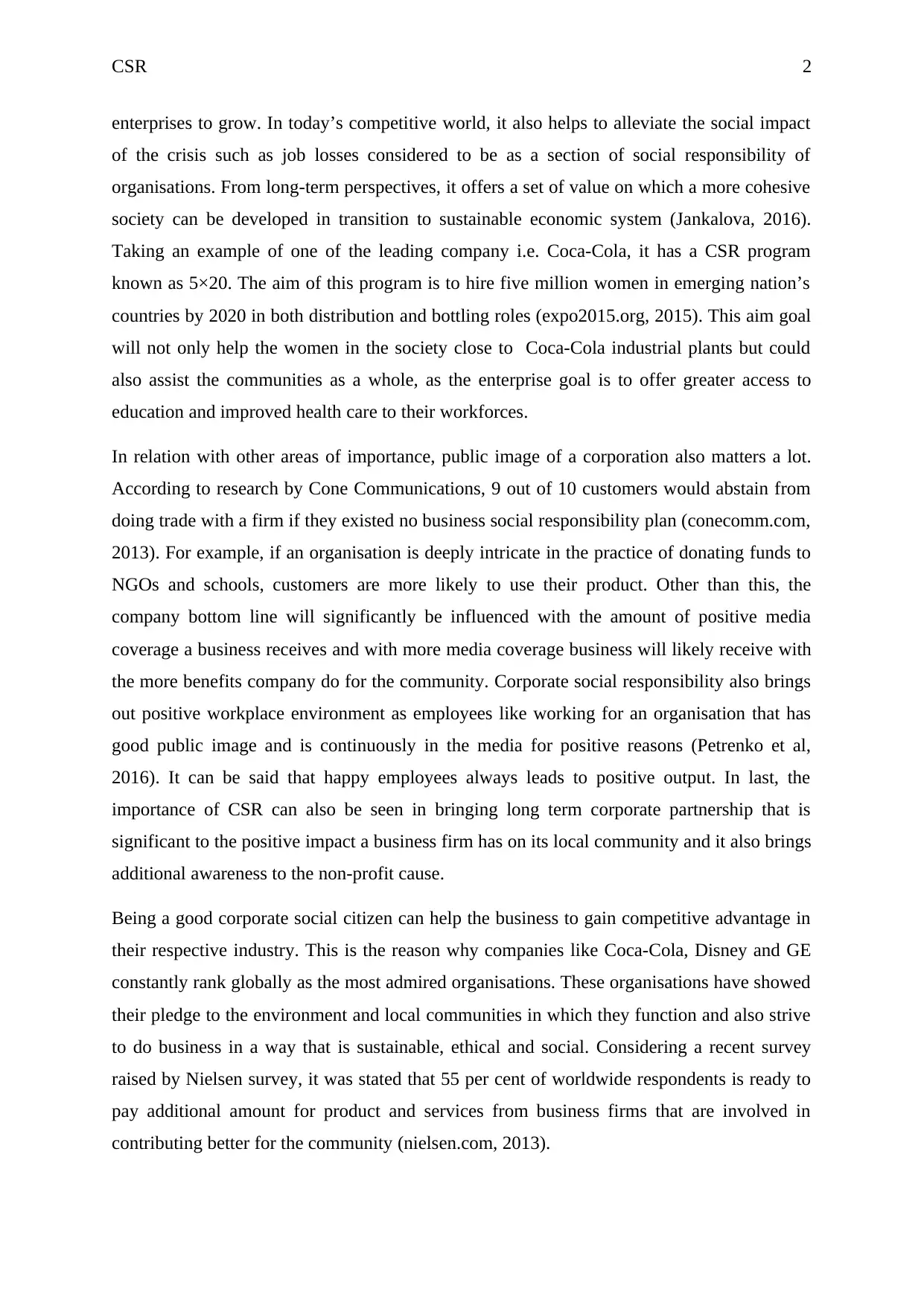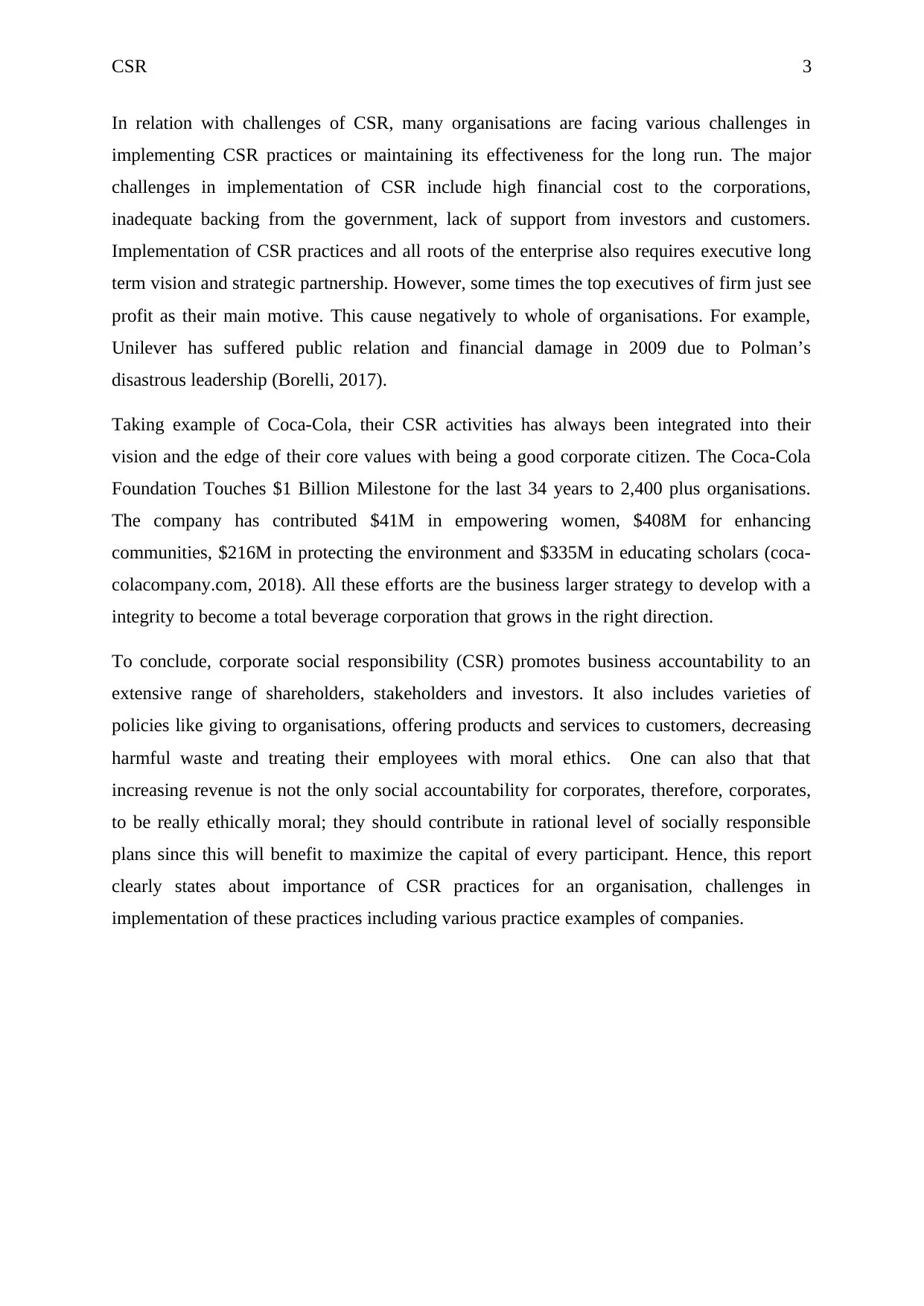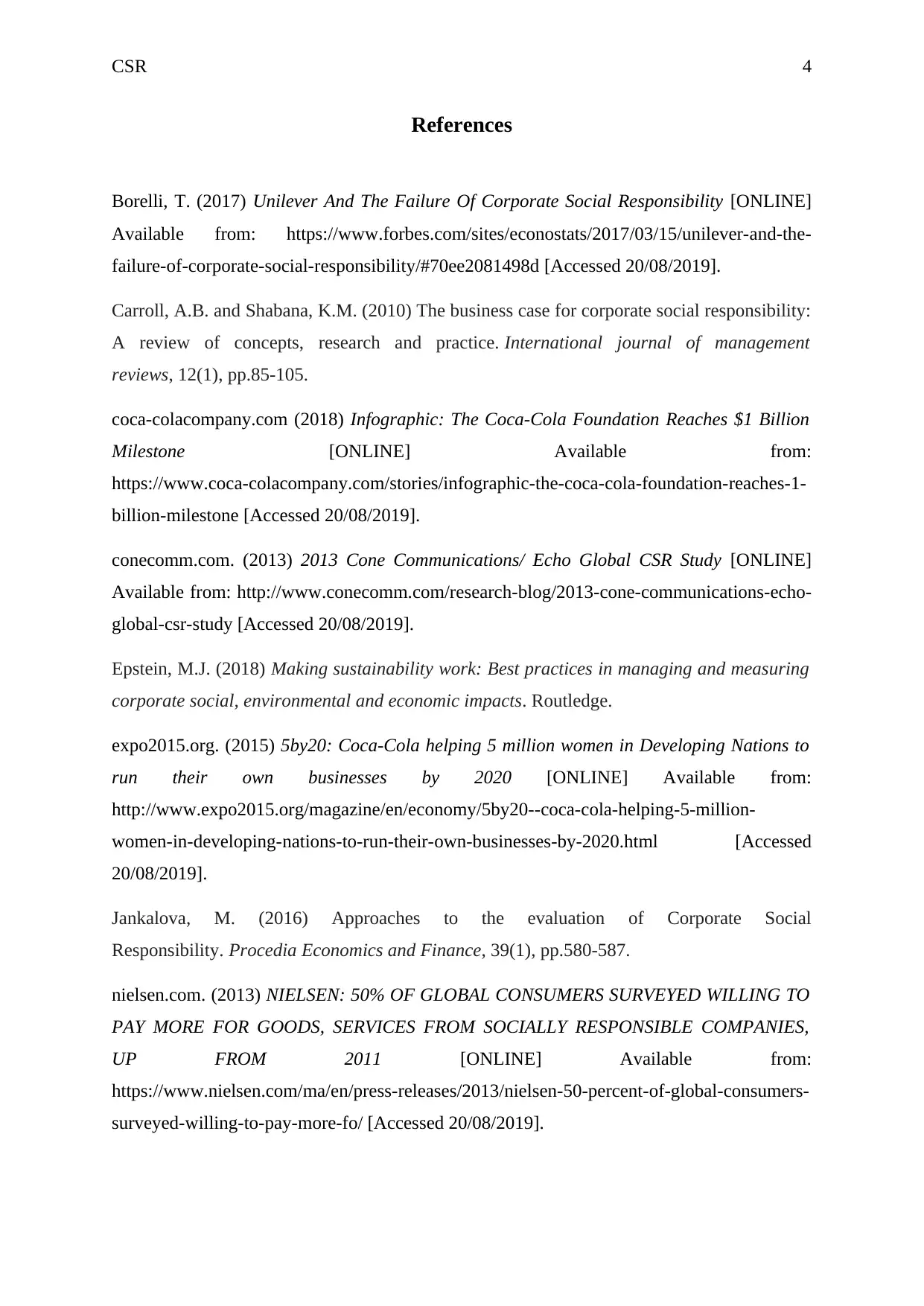Corporate Social Responsibility and Its Role in Business: A Report
VerifiedAdded on 2022/10/03
|6
|1663
|20
Report
AI Summary
This report provides an overview of Corporate Social Responsibility (CSR), defining it as a commitment by businesses to consider their impact on the environment, society, and human rights, beyond profit-making. The report emphasizes the increasing importance of CSR in today's business landscape, driven by factors such as customer expectations, cost savings, risk management, and innovation. It highlights the benefits of CSR, including improved customer relationships, positive workplace environments, and long-term corporate partnerships. The report uses the Coca-Cola Company's CSR program, 5x20, as an example. It also discusses challenges in implementing CSR, such as high financial costs, inadequate government support, and lack of investor backing. The report concludes by reiterating the importance of CSR for promoting business accountability and contributing to a more cohesive and sustainable society.

8/19/2019
Running Head: CSR 0
Managing Across Borders
Running Head: CSR 0
Managing Across Borders
Paraphrase This Document
Need a fresh take? Get an instant paraphrase of this document with our AI Paraphraser

CSR 1
Role of Corporate Social Responsibility (CSR)
Corporate Social Responsibility (CSR) is significantly increased in the business world
leading corporations to take advantage of society and consumers while benefitting them.
While undertaking CSR practices, their main motive is to care about environment, society
and human rights besides profit making. Epstein (2018) defined corporate social
responsibility as an initiative to measure and take responsibility for the organisation influence
on the society and environment in general. It also may be defined as “corporate citizenship”
where the company has to incur short term costs to encourage environmental and social
change while not providing instant economic benefit to the business enterprise.
It was found that many business firms are found challenging to fulfil the requirements of
current generation without comprising the capability of the next generation to fulfil their own
needs. In this competitive business situation, companies are being called to take upon
responsibility for the means their operations affect natural environment and societies. Both
large and small scale business firms are also asked to undertake significant sustainability
principles while the functioning of their business. This means CSR becomes an integral part
of corporate strategy of many companies that also helps them to use it as a defensive policy
(Carroll and Shabana, 2010). In terms of rationale of CSR, it can be based on a rational,
moral and economic argument.
Corporate social responsibility can be significantly said to be important in today’s world with
the continuing commitment and contribution to the economic development with improving
quality of life with keeping focus to both communities and society. A strategic approach to
CSR is progressively significant to business competitiveness. For instance, it can benefit the
company in various terms such as customer relationships, cost savings, risk management and
innovation capacity. It also promotes more environmental and social responsibility from the
business sector at a time when the emergency has negatively impacted customer confidence
and trust level incorporates. CSR requires engagement with external and internal stakeholders
allowing business to forecast better and take benefit if fast changing expectations in
operational and social conditions (Tang, Hull and Rothenberg, 2012). This implies that it can
also serve as a driver for building real growth opportunities and development of new markets.
In addition, enterprises can also develop long term consumer, employee and citizen trust by
addressing social responsibility and this, in turn, leads an innovative environment for
Role of Corporate Social Responsibility (CSR)
Corporate Social Responsibility (CSR) is significantly increased in the business world
leading corporations to take advantage of society and consumers while benefitting them.
While undertaking CSR practices, their main motive is to care about environment, society
and human rights besides profit making. Epstein (2018) defined corporate social
responsibility as an initiative to measure and take responsibility for the organisation influence
on the society and environment in general. It also may be defined as “corporate citizenship”
where the company has to incur short term costs to encourage environmental and social
change while not providing instant economic benefit to the business enterprise.
It was found that many business firms are found challenging to fulfil the requirements of
current generation without comprising the capability of the next generation to fulfil their own
needs. In this competitive business situation, companies are being called to take upon
responsibility for the means their operations affect natural environment and societies. Both
large and small scale business firms are also asked to undertake significant sustainability
principles while the functioning of their business. This means CSR becomes an integral part
of corporate strategy of many companies that also helps them to use it as a defensive policy
(Carroll and Shabana, 2010). In terms of rationale of CSR, it can be based on a rational,
moral and economic argument.
Corporate social responsibility can be significantly said to be important in today’s world with
the continuing commitment and contribution to the economic development with improving
quality of life with keeping focus to both communities and society. A strategic approach to
CSR is progressively significant to business competitiveness. For instance, it can benefit the
company in various terms such as customer relationships, cost savings, risk management and
innovation capacity. It also promotes more environmental and social responsibility from the
business sector at a time when the emergency has negatively impacted customer confidence
and trust level incorporates. CSR requires engagement with external and internal stakeholders
allowing business to forecast better and take benefit if fast changing expectations in
operational and social conditions (Tang, Hull and Rothenberg, 2012). This implies that it can
also serve as a driver for building real growth opportunities and development of new markets.
In addition, enterprises can also develop long term consumer, employee and citizen trust by
addressing social responsibility and this, in turn, leads an innovative environment for

CSR 2
enterprises to grow. In today’s competitive world, it also helps to alleviate the social impact
of the crisis such as job losses considered to be as a section of social responsibility of
organisations. From long-term perspectives, it offers a set of value on which a more cohesive
society can be developed in transition to sustainable economic system (Jankalova, 2016).
Taking an example of one of the leading company i.e. Coca-Cola, it has a CSR program
known as 5×20. The aim of this program is to hire five million women in emerging nation’s
countries by 2020 in both distribution and bottling roles (expo2015.org, 2015). This aim goal
will not only help the women in the society close to Coca-Cola industrial plants but could
also assist the communities as a whole, as the enterprise goal is to offer greater access to
education and improved health care to their workforces.
In relation with other areas of importance, public image of a corporation also matters a lot.
According to research by Cone Communications, 9 out of 10 customers would abstain from
doing trade with a firm if they existed no business social responsibility plan (conecomm.com,
2013). For example, if an organisation is deeply intricate in the practice of donating funds to
NGOs and schools, customers are more likely to use their product. Other than this, the
company bottom line will significantly be influenced with the amount of positive media
coverage a business receives and with more media coverage business will likely receive with
the more benefits company do for the community. Corporate social responsibility also brings
out positive workplace environment as employees like working for an organisation that has
good public image and is continuously in the media for positive reasons (Petrenko et al,
2016). It can be said that happy employees always leads to positive output. In last, the
importance of CSR can also be seen in bringing long term corporate partnership that is
significant to the positive impact a business firm has on its local community and it also brings
additional awareness to the non-profit cause.
Being a good corporate social citizen can help the business to gain competitive advantage in
their respective industry. This is the reason why companies like Coca-Cola, Disney and GE
constantly rank globally as the most admired organisations. These organisations have showed
their pledge to the environment and local communities in which they function and also strive
to do business in a way that is sustainable, ethical and social. Considering a recent survey
raised by Nielsen survey, it was stated that 55 per cent of worldwide respondents is ready to
pay additional amount for product and services from business firms that are involved in
contributing better for the community (nielsen.com, 2013).
enterprises to grow. In today’s competitive world, it also helps to alleviate the social impact
of the crisis such as job losses considered to be as a section of social responsibility of
organisations. From long-term perspectives, it offers a set of value on which a more cohesive
society can be developed in transition to sustainable economic system (Jankalova, 2016).
Taking an example of one of the leading company i.e. Coca-Cola, it has a CSR program
known as 5×20. The aim of this program is to hire five million women in emerging nation’s
countries by 2020 in both distribution and bottling roles (expo2015.org, 2015). This aim goal
will not only help the women in the society close to Coca-Cola industrial plants but could
also assist the communities as a whole, as the enterprise goal is to offer greater access to
education and improved health care to their workforces.
In relation with other areas of importance, public image of a corporation also matters a lot.
According to research by Cone Communications, 9 out of 10 customers would abstain from
doing trade with a firm if they existed no business social responsibility plan (conecomm.com,
2013). For example, if an organisation is deeply intricate in the practice of donating funds to
NGOs and schools, customers are more likely to use their product. Other than this, the
company bottom line will significantly be influenced with the amount of positive media
coverage a business receives and with more media coverage business will likely receive with
the more benefits company do for the community. Corporate social responsibility also brings
out positive workplace environment as employees like working for an organisation that has
good public image and is continuously in the media for positive reasons (Petrenko et al,
2016). It can be said that happy employees always leads to positive output. In last, the
importance of CSR can also be seen in bringing long term corporate partnership that is
significant to the positive impact a business firm has on its local community and it also brings
additional awareness to the non-profit cause.
Being a good corporate social citizen can help the business to gain competitive advantage in
their respective industry. This is the reason why companies like Coca-Cola, Disney and GE
constantly rank globally as the most admired organisations. These organisations have showed
their pledge to the environment and local communities in which they function and also strive
to do business in a way that is sustainable, ethical and social. Considering a recent survey
raised by Nielsen survey, it was stated that 55 per cent of worldwide respondents is ready to
pay additional amount for product and services from business firms that are involved in
contributing better for the community (nielsen.com, 2013).
⊘ This is a preview!⊘
Do you want full access?
Subscribe today to unlock all pages.

Trusted by 1+ million students worldwide

CSR 3
In relation with challenges of CSR, many organisations are facing various challenges in
implementing CSR practices or maintaining its effectiveness for the long run. The major
challenges in implementation of CSR include high financial cost to the corporations,
inadequate backing from the government, lack of support from investors and customers.
Implementation of CSR practices and all roots of the enterprise also requires executive long
term vision and strategic partnership. However, some times the top executives of firm just see
profit as their main motive. This cause negatively to whole of organisations. For example,
Unilever has suffered public relation and financial damage in 2009 due to Polman’s
disastrous leadership (Borelli, 2017).
Taking example of Coca-Cola, their CSR activities has always been integrated into their
vision and the edge of their core values with being a good corporate citizen. The Coca-Cola
Foundation Touches $1 Billion Milestone for the last 34 years to 2,400 plus organisations.
The company has contributed $41M in empowering women, $408M for enhancing
communities, $216M in protecting the environment and $335M in educating scholars (coca-
colacompany.com, 2018). All these efforts are the business larger strategy to develop with a
integrity to become a total beverage corporation that grows in the right direction.
To conclude, corporate social responsibility (CSR) promotes business accountability to an
extensive range of shareholders, stakeholders and investors. It also includes varieties of
policies like giving to organisations, offering products and services to customers, decreasing
harmful waste and treating their employees with moral ethics. One can also that that
increasing revenue is not the only social accountability for corporates, therefore, corporates,
to be really ethically moral; they should contribute in rational level of socially responsible
plans since this will benefit to maximize the capital of every participant. Hence, this report
clearly states about importance of CSR practices for an organisation, challenges in
implementation of these practices including various practice examples of companies.
In relation with challenges of CSR, many organisations are facing various challenges in
implementing CSR practices or maintaining its effectiveness for the long run. The major
challenges in implementation of CSR include high financial cost to the corporations,
inadequate backing from the government, lack of support from investors and customers.
Implementation of CSR practices and all roots of the enterprise also requires executive long
term vision and strategic partnership. However, some times the top executives of firm just see
profit as their main motive. This cause negatively to whole of organisations. For example,
Unilever has suffered public relation and financial damage in 2009 due to Polman’s
disastrous leadership (Borelli, 2017).
Taking example of Coca-Cola, their CSR activities has always been integrated into their
vision and the edge of their core values with being a good corporate citizen. The Coca-Cola
Foundation Touches $1 Billion Milestone for the last 34 years to 2,400 plus organisations.
The company has contributed $41M in empowering women, $408M for enhancing
communities, $216M in protecting the environment and $335M in educating scholars (coca-
colacompany.com, 2018). All these efforts are the business larger strategy to develop with a
integrity to become a total beverage corporation that grows in the right direction.
To conclude, corporate social responsibility (CSR) promotes business accountability to an
extensive range of shareholders, stakeholders and investors. It also includes varieties of
policies like giving to organisations, offering products and services to customers, decreasing
harmful waste and treating their employees with moral ethics. One can also that that
increasing revenue is not the only social accountability for corporates, therefore, corporates,
to be really ethically moral; they should contribute in rational level of socially responsible
plans since this will benefit to maximize the capital of every participant. Hence, this report
clearly states about importance of CSR practices for an organisation, challenges in
implementation of these practices including various practice examples of companies.
Paraphrase This Document
Need a fresh take? Get an instant paraphrase of this document with our AI Paraphraser

CSR 4
References
Borelli, T. (2017) Unilever And The Failure Of Corporate Social Responsibility [ONLINE]
Available from: https://www.forbes.com/sites/econostats/2017/03/15/unilever-and-the-
failure-of-corporate-social-responsibility/#70ee2081498d [Accessed 20/08/2019].
Carroll, A.B. and Shabana, K.M. (2010) The business case for corporate social responsibility:
A review of concepts, research and practice. International journal of management
reviews, 12(1), pp.85-105.
coca-colacompany.com (2018) Infographic: The Coca-Cola Foundation Reaches $1 Billion
Milestone [ONLINE] Available from:
https://www.coca-colacompany.com/stories/infographic-the-coca-cola-foundation-reaches-1-
billion-milestone [Accessed 20/08/2019].
conecomm.com. (2013) 2013 Cone Communications/ Echo Global CSR Study [ONLINE]
Available from: http://www.conecomm.com/research-blog/2013-cone-communications-echo-
global-csr-study [Accessed 20/08/2019].
Epstein, M.J. (2018) Making sustainability work: Best practices in managing and measuring
corporate social, environmental and economic impacts. Routledge.
expo2015.org. (2015) 5by20: Coca-Cola helping 5 million women in Developing Nations to
run their own businesses by 2020 [ONLINE] Available from:
http://www.expo2015.org/magazine/en/economy/5by20--coca-cola-helping-5-million-
women-in-developing-nations-to-run-their-own-businesses-by-2020.html [Accessed
20/08/2019].
Jankalova, M. (2016) Approaches to the evaluation of Corporate Social
Responsibility. Procedia Economics and Finance, 39(1), pp.580-587.
nielsen.com. (2013) NIELSEN: 50% OF GLOBAL CONSUMERS SURVEYED WILLING TO
PAY MORE FOR GOODS, SERVICES FROM SOCIALLY RESPONSIBLE COMPANIES,
UP FROM 2011 [ONLINE] Available from:
https://www.nielsen.com/ma/en/press-releases/2013/nielsen-50-percent-of-global-consumers-
surveyed-willing-to-pay-more-fo/ [Accessed 20/08/2019].
References
Borelli, T. (2017) Unilever And The Failure Of Corporate Social Responsibility [ONLINE]
Available from: https://www.forbes.com/sites/econostats/2017/03/15/unilever-and-the-
failure-of-corporate-social-responsibility/#70ee2081498d [Accessed 20/08/2019].
Carroll, A.B. and Shabana, K.M. (2010) The business case for corporate social responsibility:
A review of concepts, research and practice. International journal of management
reviews, 12(1), pp.85-105.
coca-colacompany.com (2018) Infographic: The Coca-Cola Foundation Reaches $1 Billion
Milestone [ONLINE] Available from:
https://www.coca-colacompany.com/stories/infographic-the-coca-cola-foundation-reaches-1-
billion-milestone [Accessed 20/08/2019].
conecomm.com. (2013) 2013 Cone Communications/ Echo Global CSR Study [ONLINE]
Available from: http://www.conecomm.com/research-blog/2013-cone-communications-echo-
global-csr-study [Accessed 20/08/2019].
Epstein, M.J. (2018) Making sustainability work: Best practices in managing and measuring
corporate social, environmental and economic impacts. Routledge.
expo2015.org. (2015) 5by20: Coca-Cola helping 5 million women in Developing Nations to
run their own businesses by 2020 [ONLINE] Available from:
http://www.expo2015.org/magazine/en/economy/5by20--coca-cola-helping-5-million-
women-in-developing-nations-to-run-their-own-businesses-by-2020.html [Accessed
20/08/2019].
Jankalova, M. (2016) Approaches to the evaluation of Corporate Social
Responsibility. Procedia Economics and Finance, 39(1), pp.580-587.
nielsen.com. (2013) NIELSEN: 50% OF GLOBAL CONSUMERS SURVEYED WILLING TO
PAY MORE FOR GOODS, SERVICES FROM SOCIALLY RESPONSIBLE COMPANIES,
UP FROM 2011 [ONLINE] Available from:
https://www.nielsen.com/ma/en/press-releases/2013/nielsen-50-percent-of-global-consumers-
surveyed-willing-to-pay-more-fo/ [Accessed 20/08/2019].

CSR 5
Petrenko, O.V., Aime, F., Ridge, J. and Hill, A. (2016) Corporate social responsibility or
CEO narcissism? CSR motivations and organizational performance. Strategic Management
Journal, 37(2), pp.262-279.
Tang, Z., Hull, C.E. and Rothenberg, S. (2012) How corporate social responsibility
engagement strategy moderates the CSR–financial performance relationship. Journal of
Management Studies, 49(7), pp.1274-1303.
Petrenko, O.V., Aime, F., Ridge, J. and Hill, A. (2016) Corporate social responsibility or
CEO narcissism? CSR motivations and organizational performance. Strategic Management
Journal, 37(2), pp.262-279.
Tang, Z., Hull, C.E. and Rothenberg, S. (2012) How corporate social responsibility
engagement strategy moderates the CSR–financial performance relationship. Journal of
Management Studies, 49(7), pp.1274-1303.
⊘ This is a preview!⊘
Do you want full access?
Subscribe today to unlock all pages.

Trusted by 1+ million students worldwide
1 out of 6
Related Documents
Your All-in-One AI-Powered Toolkit for Academic Success.
+13062052269
info@desklib.com
Available 24*7 on WhatsApp / Email
![[object Object]](/_next/static/media/star-bottom.7253800d.svg)
Unlock your academic potential
Copyright © 2020–2026 A2Z Services. All Rights Reserved. Developed and managed by ZUCOL.





